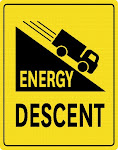A scientific justification of nonscientific 'slow text'
Monday, May 30, 2011
Just as I was finishing a slow text treatment of a Bernard Stiegler transcript (below), my friend Ian sent through a link to an article that states “The reason that the unusual fonts are effective is that it causes us to think more deeply about the material,” a co-author of the study, Daniel M. Oppenheimer, a psychologist at Princeton, wrote in an e-mail. “But we are capable of thinking deeply without being subjected to unusual fonts. Think of it this way, you can’t skim material in a hard to read font, so putting text in a hard-to-read font will force you to read more carefully.”






2 comments:
So are you suggesting P that slow (text), slow observation (find ten tones, then twenty) may lead to something other than the squint-sight of dislocation? Are not your poems complex abstractions of and for the same reason? Love.
thanks glen, thanks for these questions.
to your first: yes, i think i am.
squint-sight – criticality – and dislocation – separateness, disjointedness – are not always united. eg foraging, i have learnt in recent years, is both critical observation and being at the same time; accruing local ecological knowledges for survival while being a biophysical organism; walking, gathering, climbing, etc.
in 'a free-dragging manifesto' i was suggesting that being critical is the cause for dislocation, divorce, although i was never advocating for not being critical. in being an activist, for example, and being critically aware of a technical system that degrades and pollutes (bottled water, for instance), you find many people will avoid talking with you because they don't want to be reminded of unpleasant things. but you can't get it out of your head to talk about anything else, hence the divorce, in this case, the social separation. a sydney pop-folk band recently wrote a song about the social outcast, 'the environmental activist'. if you drink fast beverages bottled in plastic, follow the footy, watch commercial tv, eat fast and industrialised foods, drive and fly the planet into aggregating crisis, then yours is, arguably, a very acceptable, naturalised existence. society validates this sort of human activity, so socially you are 'connected', or rather anthropocentrically you are connected.
in answer to your second q: slow text is supposed to make the text more concrete, not more abstracted. although what actually happens seems dependent on the individual reader and his or her impressions of what actually constitutes 'concrete' and what 'abstract'.
my intention, with a slow text, is to make greater physical diversity on the page by giving greater values and entities to individual letters (using chance, beyond my full control), and in doing so slow the reading down so as the premises can't slide by so fast (to site derrick jensen 2006).
slow text is a form in progress, and so i really appreciate your questions to help tease out some of these apparent contradictions.
in saying all this, reading the stiegler text on the train back from melb tonight, i really think this particular slow text works well, bc the resistance to the eye is not so great, but enough to arrest and make physical the read (like foraging). i recognise, though, that i am fond of this text and it is a delight to read.
Post a Comment